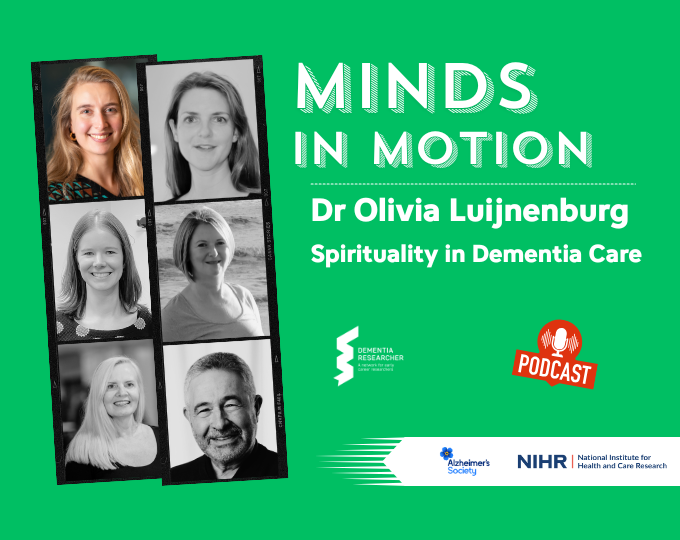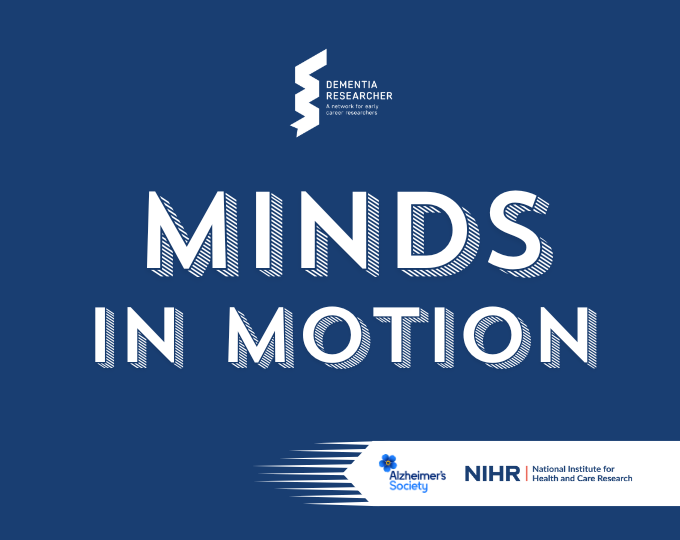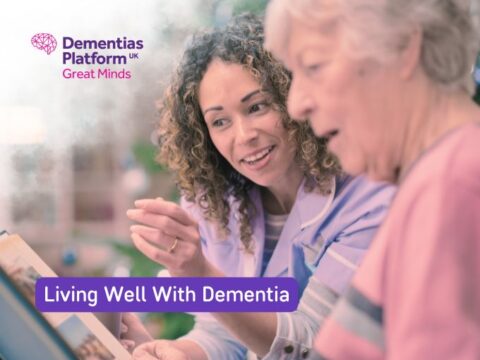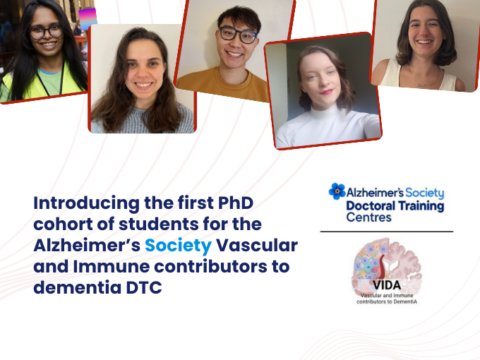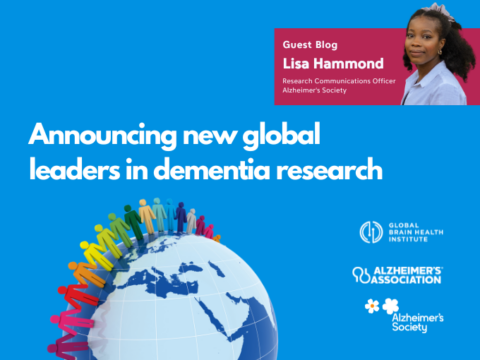The Minds in Motion Podcast from Dementia Researcher in association with the NIHR Applied Research Collaborations and Alzheimer’s Society, brings together NIHR Dem Comm Research Fellows, to talk about their research and careers.
Over the next few months, we will be releasing the second series, hearing from five of the Dem Comm Fellows each taking e a turn as co-host and guest. Alongside the researchers we have the incredible Trevor Salomon, Alzheimer’s Society Volunteer & Chair of the European Dementia Carers Working Group as our permanent co-host and anchor.
In show Trevor is joined by the guest from our previous show Dr Olivia Luijnenburg from King’s College London and the NIHR Applied Research Collaboration (ARC) South London to interview Dr Elisabeth (Lis) Grey.
Lis works in the NIHR ARC West and University of Bristol. Lis is interested in how people with neurodegenerative disorders experience health and care services and is working on developing ways to improve services and support people to live well with these conditions. Lis has had a varied research career – from health services quality and delivery, through public health interventions and social care, and now more secondary and community care. The common threads to this work are health communication – be that between professionals, patient and professional, or to the public – and intervention development and evaluation. Lis mainly uses qualitative methods, particularly interviewing, and she is always excited to hear people’s thoughts and experiences through her work.
Dem Comm is a 2 year programme funded by the National Institute of Health and Care Research and the Alzheimer's Society. It supports a new generation of dementia research leaders, bringing together researchers from different multidisciplinary backgrounds to encourage cross-cutting and community-orientated dementia research projects that can address key gaps in the evidence around dementia care and support, delivering transformative translational research.
The Minds In Motion Podcast from Dementia Researcher in association with the NIHR, applied research Collaborations and Alzheimer's Society. Showcasing exciting new research and the work of the DemCom Fellows.
Trevor Salomon:
Hello, and welcome back for another episode of the Minds in Motion podcast from Dementia Researcher. Today we're meeting Dr. Lis Grey from the University of Bristol and the National Institute for Healthcare Research applied Research Collaborations. In this show, we're going to learn more about her career and research.
Hello, I'm Trevor Salomon. I'm an Alzheimer's Society champion and campaigner and chair of the European Dementia Carers Working Group. I'm also a carer for my wife, Yvonne, who was diagnosed with young onset Alzheimer's disease at the age of 57. I'm delighted to be co-hosting today's podcast alongside the brilliant Dr. Olivia Luijnenburg, who we met in the first show. Hi, Olivia.
Dr Olivia Luijnenburg:
Thanks, Trevor. Morning both. It's great to be back and taking my turn alongside you in the hosting spot. So as Trevor mentioned, I'm Olivia Luijnenburg and I'm based at King's College London. I'm a medical anthropologist with a particular interest in residential care for older people, but that's really enough from us, because the star of the show is our brilliant guest, Dr. Lis Grey. So, just to set the scene a little, for people with neurodegenerative disorders, navigating health and care services can be an overwhelming journey. A topic that I know you, Trevor, know lots about. And often services are fragmented with limited coordination between healthcare, social support and specialist care. People face complex evolving needs that demand a tailored, compassionate approach to help them maintain quality of life. And this is exactly why your work is so important. So, let's find out more.
Trevor Salomon:
Hi Lis. Could I start by asking you please to introduce yourself?
Dr Lis Grey:
Sure. I'm Dr. Lis Grey. I'm a research fellow at the University of Bristol and the ARC West. I've been a health researcher for a while now. I have a background in psychology, but I've moved more into working in public health and then in health services research, and now moved more to working with older adults, and particularly in dementia in Parkinson's care.
Trevor Salomon:
Thank you. And can you tell us specifically now about your current research?
Dr Lis Grey:
I'm involved in quite a few projects. The main one for the dementia fellowship has been an evaluation of a Parkinson's rapid access service. That's an ethnographic study, which involves observing the clinic consultations and multidisciplinary team meetings, interviewing patients and carers, who visit the clinic, and interviewing staff as well, who are involved in providing service. That study, I've just finished data collection for that, so I'm getting started on the analysis, and I can talk a bit more about that if you've got questions.
Also involved in a new project, which we're just starting with some other dementia fellows, including Chris and Rasa, who were in the previous series of this Minds in Motion podcast. And Katie Brehene, who I'll speak to next, and Liana Lurida, also a dementia fellow, but that's looking at domiciliary care and how we can use technology to design a platform that will improve the coordination of domiciliary care provision. Also involved in some projects looking at loneliness and loneliness in people with dementia, with Parkinson's and carers, again, how technology could be used to support them to address loneliness. And through my work in the hub, I'm also getting more interested in prognostics and advanced care or advanced care planning for people with Parkinson's and dementia. So that's research in a nutshell.
Trevor Salomon:
Can I pick up on the word loneliness? I didn't know you were going to use that. In my world, which is dementia and a lot of interactions with carers, I find it's the carers who feel the most lonely. And I don't know if your research extends into that area as well.
Dr Lis Grey:
Yes. So, it's something I'm starting to get into. Before this fellowship I was involved in some work looking at loneliness during the pandemic, among older adults. And a lot of people had caring responsibilities, how the pandemic impacted them and impacted their loneliness. That's what interested me in that field. And it's something that has come up during the hub evaluation is, how isolating and lonely it can feel to be either a carer or a person with quite advanced Parkinson's. How restrictive it can be to your life, getting out, a lot of your previous social activities. It's just harder to get involved with them for many reasons. And then, being a carer as well, being restricted to the house to care for the person with Parkinson's or whatever, your social as well will be impacted by that. And that's, I guess, where the loneliness comes in.
Dr Olivia Luijnenburg:
I would be really interested in understanding if you, because I think you have a background also in intervention development, is that correct?
Dr Lis Grey:
Yes. Yeah.
Dr Olivia Luijnenburg:
Have you applied that to this particular topic, for example, because what are ways you thought of developing into better support for that particular challenge? For example.
Dr Lis Grey:
We're hoping to start a new project looking at how technology could be used to overcome loneliness. We think it hasn't quite been exploited as it could be. There's lots of affordances that technology offers most. There have been some interventions for loneliness using technology, but they tend to rely on phone calls or zoom, whereas technology can offer quite a lot more. That would be a co-design project working with carers and with people with neurodegenerative disorders in a sort of iterative series of workshops, trying to co-design. Well, first of all, see what are the specific impacts of loneliness on them, how it makes them feel, what are the impacts in their life, and looking at what different technologies could offer and then, further workshops to try and match those up and find different ways that we could use technology to address loneliness.
Trevor Salomon:
I think technology came of age during COVID, I think without Zoom. And you mentioned Zoom, which I think was the first one that most people got to grips with terms of being able to see and speak to other people, those who were caring and particularly caring for people with dementia. So they were truly isolated for a very long time. Without Zoom, I think they would've been tearing their hair out because they could join communities, people that were experiencing the same challenges as they were, and it made them feel less isolated. And also, people were sharing tips and strategies for coping during COVID. So I think of all the technologies that came of age in the last three or four years, I think Zoom at the time was probably the most important from my perspective. I don't know if you agree.
Dr Lis Grey:
I think, there's lots of benefits to Zoom and it's certainly very accessible, it's free. And there are lots of sites to help you and information about how to use it, how to get on board. It does have limitations, particularly for people with dementia and Parkinson's, in terms of using it. And that's more where we want to come in and see what different capabilities that technology could offer, how that could overcome different aspects of loneliness, because there is this social connectivity aspect of loneliness, but there's also things like generativity or a need to feel valued and contribute to society, which just talking on a telephone or a Zoom call to a Be-friender, while that's helpful. It might not be meeting that particular need.
Dr Olivia Luijnenburg:
I think still on the topic of technology, I'm sure you've been asked this before, about the ethical implications of using technology as an intervention as well, particularly with things that might breach some privacy or things like that. Have you encountered that, in any of your projects, and how do you think about that as an ethical issue?
Dr Lis Grey:
Because I haven't yet developed the technological intervention, it hasn't been a specific problem, but that was something we encountered in, while it was a survey and interview-based study during the pandemic, was that, quite a few people are fearful of providing too much information about themselves online, not understanding how their information is used. That actually affects across the age groups and it's something that isn't particularly well dealt with, but it would be something, if we do come up with some interesting technologies that could be taken forward, that will be something we'll have to grapple with.
Dr Olivia Luijnenburg:
So when looking at health communication between patients and professionals, what are some subtle forms of miscommunication or misunderstanding that you think have a significant impact on care and how might your research influence strategies to bridge these gaps?
Dr Lis Grey:
There are lots of potential areas for miscommunication or misunderstanding or just having a lack of a shared understanding between the practitioner and the patient. I'm trying to think of some specific examples, that I've come across. Perhaps professionals, assuming that patients have a better knowledge of care pathways or understanding of what happens next in terms of their care, or assuming that patients aren't interested in that and that all appointments that they have with their practitioner, they'll perceive them as the same. But I think what I've found, from speaking with more patients and carers is they do quite like to have a good understanding of how the different services integrate with each other and knowing what happens next and who to talk to, if they have a specific kind of problem, that helps them understand what to expect.
Other things that I've come across, perhaps maybe not eliciting patient's views or values or patients not feeling able to provide a sort of holistic view of their values. That obviously, has quite a big impact on shared decision-making, and it's kind of hindered by lack of time and appointments. I think there are some things that practitioners can do to help with this, trying to build up a rapport in the first place, even if it is a tight appointment time, there are ways that you can help people feel easier and more comfortable to express their feelings. Perhaps, we could think a bit more about before appointments as well, helping patients and carers prepare, helping them to think about what they want to cover in a specific appointment, how they might want to talk about whatever issues particularly bothering them.
Trevor Salomon:
Can I share my experience with you, Lis?
Dr Lis Grey:
Sure.
Trevor Salomon:
This is typical and perhaps give some pointers to where things can change. It took four years to get a diagnosis for my wife's dementia. It's unfortunately not untypical. At the point of diagnosis, we were dismissed. It was as if the professional's practitioner skills stopped at that point. We were given a folder of forms and information and that was it. And all that served to do, was to emphasise the feeling of being isolated from the get-go. It's like, well, you're on your own now, off you go. And I think the most important aspect of improving communication, it should be at the point of diagnosis, we need signposting, we need pathways. We could do a lot better work working with the specialist charities, in relation to some of the diseases and illnesses. So that people feel that they are supported from the point of diagnosis and not left on their own. And I don't know if you've heard that from other people or you've experienced it and you've observed it, but that's probably one of the biggest disappointments of all, particularly in the dementia world.
Dr Lis Grey:
Yeah, no, I completely agree. And that's definitely something that comes up in other disorders as well. Partly, I think it's due to different services, different practitioners in different services, not having an idea of what's available from other services. Partly, I think there's also an expectation of better knowledge in the patients and carers, about how different services are arranged and how you can access them by the practitioners, in patients and carers. Whereas, I don't think... Because it differs so much in different regions, I'm not sure people do have as good an understanding as maybe the practitioners do.
There's also a move towards, more patient initiated follow up, PIFU. I'm not sure that many people really understand that, but essentially it's that, practitioners wait for patients to get in touch with them to say, I've declined or I need more help now. If patients don't understand that it's up to them to get in touch, that there isn't going to be a regular routine follow up or that they have to wait for their routine follow up. Which sometimes follow-up times can be about 18 months now and that, there's a feeling that they can't access services in between. There's a potential problem there.
Trevor Salomon:
That's the reality. You can't walk away from reality. And because I was very proactive, I just got on with it. But a lot of people don't show the initiatives that I have and particularly carers, they feel that they're failing miserably and they're not. It's because nobody's really given them any advice on how to be a carer and what to expect, and where to go for support, let alone, how to apply for benefits and everything else that could really enable and help them. So, I don't really think we've improved very much from when my wife was diagnosed back in 2013. And that's really quite worrying.
Dr Lis Grey:
I think again, there's the divisions in whose responsibility and which service can help with different things. So in healthcare, you would get your diagnosis and they will treat the medical aspects of it, but I think there's an assumption that social care will then get involved and pick you up and help you with the other things. Whereas, I'm not sure that there's that much communication sometimes, between the health and social care, knowing what's been said to whom about different things. Completely agree about not knowing how to get, say, domiciliary care visits arranged. There's definitely a lack of information about that and care homes how to sort those out. There's potential for a lot more support to be delivered.
Trevor Salomon:
So, if you could wave your magic wand, I like magic wands if only we have, what strategies or changes do you believe could realistically help professionals offer more person centric empathetic care, given the limitations that exist already in the system?
Dr Lis Grey:
So, I have to work within the current system and funding arrangements. If I had the magic wand, I would just have some more funding for some support services, not necessarily healthcare practitioners, but an organised service that could do some of that signposting and helping people arrange the support that they need, and recognising what's available and putting them in touch with people. In some areas that's done on a voluntary basis. There are voluntary services set up to help people navigate care, but relying on volunteer makes it very vulnerable to lack of funding, people not being able to carry it on. It's not a sustainable pathway.
Trevor Salomon:
I respect your answer, because I was involved in an interesting conversation the other week about funding in the world of dementia and there were carers on this call that I was involved in. And without exception, everybody said, given we are making advances in dementia research and we are making advances in drugs coming through. But if people had a choice between putting more money into research or support, everybody said, they'd rather have the money go into support. Which is... You didn't say that versus research, but looking at it in isolation, putting more money into support would enable a lot more people in the short term. It shouldn't be to the detriment of research, because we all know we're making progress with dementia drugs, but right now people feel they need that support more than anything else, particularly with advancing dementia, because they know that no drug can make any difference to it.
Dr Lis Grey:
I think it's a matter of working out how to divide the funds. And traditionally, I think we've been pushing more towards secondary care and I mean, it's hard to argue against it. When people really need care at the point of a rapid decline or a crisis, you wouldn't want to take funding away from that, but in the long term, it's just the problems are building up before that point and we are not providing enough funding and support for that area.
Dr Olivia Luijnenburg:
And I mean, okay, we talked about a magic wand and best case scenarios, but just wondering about your experience, yourself, around bringing your research into practise. Are there any areas of resistance that you encounter, when trying to implement your research into practical application? And if you do find any challenges, how do you navigate these and strive for impact?
Dr Lis Grey:
I can talk about this a bit from a previous field I used to work in, more in public health. It's with a different population. But we found that, it was very hard when there's a lack of a reliable communication pathway to practitioners, different local authorities all doing different, providing different services, organising their services in different ways. And there wasn't a way to get an intervention universally rolled out, how we would've liked. So in terms of overcoming that, I'm not sure we found the answer, but the first step is monitoring the implementation and finding the problems working with project partners ideally from the point of developing an intervention so that you know it's going to fit with their practises. Obviously, that's different when they're all working in different ways, but trying to design something from the start that is going to be usable for as many people as possible.
Dr Olivia Luijnenburg:
I think this is so important, isn't it? That we don't just give a tool or we do some kind of research and then leave it there. It's really about also the aftermath of it and sort of keeping in touch with it, isn't it? And making sure that it keeps adapting also to an adapting world.
Dr Lis Grey:
Yeah. And it's hard when you develop something, usually on a fixed term project with a fixed budget and then, you have to move on as a researcher to the next research project and there's no one to take it further. I think, we really need to think about how those are going to be managed from the start. Who's going to take an intervention on, who's going to take the findings further?
Trevor Salomon:
And I just mentioned, in passing, the new treatments coming through for dementia and I wondered how well prepared do you think health systems are for new treatments? What's your take on that?
Dr Lis Grey:
Well, it depends on the treatment. I'm guessing, you're talking about the Canemab and the Lecanemab new treatments. I'm not sure they are that well-prepared. So, I would agree with that critique. There's lots of ways that they need more investment, I guess, in screening and identification of people who are sort of suitable for the treatments, for those particular drugs. It sounds like more monitoring of patients, for what sounds like quite a high risk intervention really, but also more support for people to make treatment choices. Which is, again, hard in very short appointment times where you need to ideally find out what people's values are, in terms of understanding quite how involved a treatment is. How that's going to fit into their lifestyle, what it's going to help them achieve. I think we have an obligation to help people understand these and make decisions that fit with their values. But I'm not sure that that's really, that's been thought about as much as it could be.
Trevor Salomon:
I think you hit the nail on the head when you mentioned the words early diagnosis. Like many other diseases and illnesses, the earlier anyone is diagnosed with something, the more able we are to support them. And I use the word support rather than treat, because with dementia we can't really treat them right now, although it's coming. So, I think you're right. If I had that choice, I would be investing in much more support for early diagnosis. Thank you. We're going to move on now. I'm going to ask you to talk about yourself shortly, rather than the research, but I'd love to know if there's any other project that you are working on that you'd like to mention to our viewing and listening audience.
Dr Lis Grey:
Coming back to the domiciliary care project that we're starting up, we're looking for people involved in providing domiciliary care to get involved in that and help us shape the intervention we're developing. So, I guess if anyone is listening who would like to get involved in that, let me know.
Trevor Salomon:
And what does that mean?
Dr Lis Grey:
So, we're again using co-design workshops for that. So first of all, finding out what a platform would need to provide a digital platform would need to provide for people, for care managers, care providers, patients, and carers in terms of helping them schedule and choose different domiciliary carers, to come in to their homes to provide care. What's needed from both the management, the company side, what's needed from the patient side as well. Obviously, the practical aspects of what a platform looks like, how easy it is to navigate, but also what needs to be involved in it and how we can match people up.
Trevor Salomon:
So, they need to get in touch.
Dr Lis Grey:
Yes, and I think my email address is on the Dementia Researcher website. There's also, Rasa Mikelyte and Chris Poyner, are also involved in that and they're the co-PIs
Trevor Salomon:
We're in to the last part of the podcast now. Going to have some speedy career questions for you, that we hope will help others thinking about working in this field and share. We'd like you to share some of what you've learned from across your career and through the DemCom Programme.
Dr Olivia Luijnenburg:
So Lis, are you ready? Remember, short answers only.
Dr Lis Grey:
Okay.
Dr Olivia Luijnenburg:
So first, what inspired you to specialise in this field?
Dr Lis Grey:
I have been interested in dementia for quite a while. My dad has now, quite advanced dementia, so that's kind of been a pull and a push for me in some ways. I knew quite how sad it can be, to be stuck thinking about it for a long time, but also obviously, an impetus to get involved and try and help improve things.
Trevor Salomon:
That was a nice short answer. Thank you very much. I'm sorry to hear about your dad. What's one piece of advice you'd give to early career researchers, Lis?
Dr Lis Grey:
Take your annual leave, because no one's going to get to the end of their life and think, I wish I hadn't had so many holidays.
Dr Olivia Luijnenburg:
Is there a career milestone, that's been particularly meaningful to you?
Dr Lis Grey:
Not really, no. Sorry,
Trevor Salomon:
When we said short answers, I'm not sure we were envisaging that short.
Dr Olivia Luijnenburg:
Is there a sort of milestone ahead maybe that you can think of, that you're trying to reach?
Dr Lis Grey:
I guess, every project I've been involved in has had little milestones and it's good to hit them, but it's more the small achievements that just mount up over the years, rather than one specific thing. Sorry, that's not the answer you wanted.
Trevor Salomon:
There was no defined answer. That's your answer. That's absolutely spot on. How has being a DemCom fellow shaped or influenced your approach to your research, Lis?
Dr Lis Grey:
I've really enjoyed being part of the dementia community practise. I think it is. It's just introduced me to a lot of really interesting and enthusiastic people, which sort of rubs off on you, that the enthusiasm I've had. It's just opened up opportunities as well to work with people like Olivia and Rasa and I worked on an ethics resource, which I wouldn't have thought of doing on my own, but it's just finding people who have a common interest and doing something together.
Dr Olivia Luijnenburg:
Yeah, I agree. That's really also what I found incredible about. We have a very similar answer to this, basically. And then, what skills or qualities do you think are essential for success in qualitative health research?
Dr Lis Grey:
Quite similar to any health research, but I guess in terms of interviewing, it helps to learn to be comfortable with silence, to allow someone to think about their response and not jump in when there is a silence, just to try and fill the gap. Being patient always helps in research, as well, I found.
Trevor Salomon:
I like that answer because I would say, all the skills it took me a long time to master, silence and being quiet when you're waiting for somebody to give you an answer, was one of the hardest things. We all naturally, want to plug the gap and say something,
Dr Lis Grey:
But then, you can't find that your interviewee might agree with you or you find you're putting words in their mouth.
Dr Olivia Luijnenburg:
And I have to say, going through your own interviews and transcripts is really helpful with that, because you can see when you were completely interrupting someone's train of thought to listen back to the conversation. So, I would really recommend also listen back to your interviews, even if it's really painful to do sometimes, but I think you learn a lot that way. I learned a lot.
Trevor Salomon:
So, how do you motivate yourself and keep the momentum going, in your field? What do you do outside of your work that makes you want to get up the following day and carry on doing what you're doing?
Dr Lis Grey:
Well, the motivation to keep working is having a good team of people to work with, building up good relationships with your colleagues, but also, I really enjoy talking to patients, practitioners, carers, the people who I'm doing my research with and for. So, you're not necessarily seeing the impact from your research, but you are really seeing the reason why you are doing it. So yeah, that's why I'm doing it. But outside research, the things that try and keep me sane, running, I enjoy that, and just making sure that you get outside every day and away from the computer.
Trevor Salomon:
I like your use of the word team. I think people often hear the word researcher and think that people are just very isolated working on their own. I'm not sure that anybody can work totally on their own. So, it's interesting to know that the team motivates you and you motivate each other.
Dr Lis Grey:
Yeah. Sometimes, some projects can be quite... I have worked on somewhere. I'm not completely alone. I'm reporting to people, but I was the only researcher on the project that can be quite lonely and hard to be motivated for. So, yes, I definitely prefer the team working aspect of it.
Trevor Salomon:
Right. Final question. This is just for fun. I'm going back to my magic wand again now. I like magic wands. If only I could have one. If you could wave your magic wand and acquire any skill or superpower to help you with your research, what would it be and how would you use it, Lis?
Dr Lis Grey:
I'm not sure I have a good answer. I wish... It's probably not a superpower, but I wish I thought a bit faster. My thoughts tend to arrive all at once in a big mess, and then, I take a long time to sort of pull them apart and work out what is a useful thought and what is not a useful thought. And I sit in meetings sometimes with people who just have that ability, to think really profound thoughts it seems to me, and deliver them in an instant. One day, I hope to get to that point. I'm not sure if that's a superpower or not, but it eludes me at the minute.
Dr Olivia Luijnenburg:
I would love that too. I definitely think that's a superpower. And I think again, it sort of speaks to, having teamwork is really helpful because it sort of maybe helps you make sense of all your thoughts and the ones that are important and less important.
Dr Lis Grey:
Yeah.
Trevor Salomon:
I think I had that superpower, but unfortunately what was missing from it was the ability to open my mouth and say the right thing. So I [inaudible 00:34:18] not open my mouth until I've found something worthwhile saying, otherwise, I just would make a fool of myself. But yeah, I'm with you. That's quite an interesting superpower to have.
Dr Olivia Luijnenburg:
Well, I'm afraid that, this is all we have time for today. If you can't get enough of this topic, visit the Dementia Researcher website, where you'll find a full transcript and biographies on all of us. And I would like to thank our incredible guest, Dr. Lis Grey, very much. It was such a lovely conversation. Thank you very much. So, I'm Olivia Luijnenburg.
Trevor Salomon:
And I'm Trevor Salomon. And you've been listening to the Dementia Research Podcast.
Voice Over:
The Dementia Researcher Podcast was brought to you by University College London, with generous funding from the UK National Institute for Health Research, Alzheimer's Research UK Alzheimer's Society, Alzheimer's Association, and Race Against Dementia. Please subscribe, leave us a review and register on our website for full access to all our great resources. Dementiaresearcher.nihr.ac.uk.
If you would like to share your own experiences or discuss your research in a blog or on a podcast, drop us a line to dementiaresearcher@ucl.ac.uk
Did you know... you can find our podcast in your favourite podcast app on mobile devices, and our narrated blogs are also available as a podcast.
The views and opinions expressed by the host and guests in this podcast represent those of the guests and do not necessarily reflect those of UCL or Dementia Researcher

 Print This Post
Print This Post


